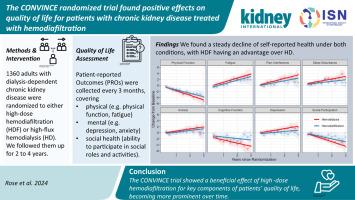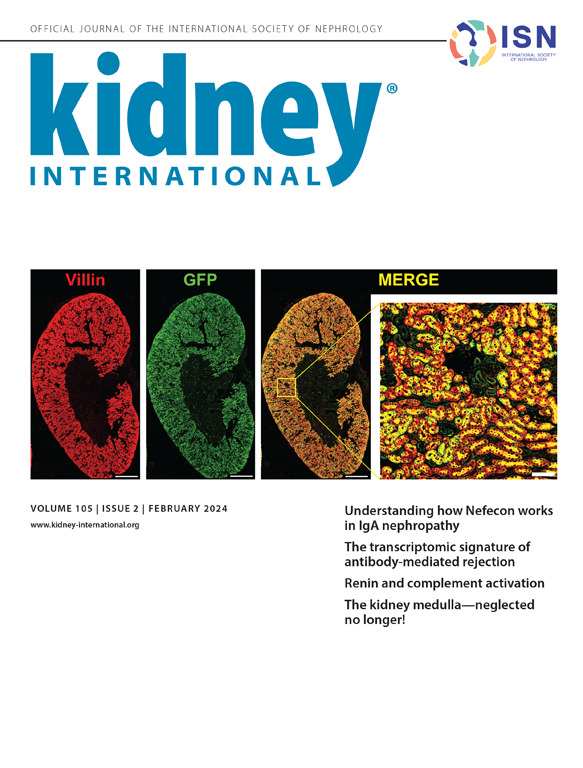The CONVINCE randomized trial found positive effects on quality of life for patients with chronic kidney disease treated with hemodiafiltration
IF 12.6
1区 医学
Q1 UROLOGY & NEPHROLOGY
引用次数: 0
Abstract
In the CONVINCE trial, the primary analysis demonstrated a survival benefit for patients receiving high-dose hemodiafiltration (HDF) as compared with high-flux hemodialysis (HD). A secondary objective was to evaluate effects on health-related quality of life (HRQoL); assessed in eight domains (physical function, cognitive function, fatigue, sleep disturbance, anxiety, depression, pain interference, social participation) applying instruments from the Patient-Reported Outcome Measurement Information System (PROMIS) before randomization and every three months thereafter. In total 1360 adults with dialysis-dependent chronic kidney disease, eligible to receive high-flux HDF (23 liters or more), were randomized (1:1); 84% response rate to all questionnaires. Both groups reported a continuous deterioration in all HRQoL domains. Overall, raw score changes from baseline were more favorable in the HDF group, resulting in a significant omnibus test after a median observation period of 30 months. Most relevant single raw score differences were reported for cognitive function. Patients receiving HDF reported a decline of -0.95 units (95% confidence interval - 2.23 to +0.34) whereas HD treated patients declined by -3.90 units (-5.28 to - 2.52). A joint model, adjusted for mortality differences, utilizing all quarterly assessments, identified a significantly slower HRQoL decline in physical function, cognitive function, pain interference, and social participation for the HDF group. Their physical health summary score declined -0.46 units/year slower compared to the HD group. Thus, the CONVINCE trial showed a beneficial effect of high-dose hemodiafiltration for survival as well as a moderate positive effect on patients’ quality of life, most pronounced with respect to their cognitive function.
Registration
NTR7138 on the International Clinical Trials Registry Platform

CONVINCE 随机试验发现,接受血液滤过治疗的慢性肾病患者的生活质量会得到改善。
在 CONVINCE 试验中,主要分析表明,与高通量血液透析(HD)相比,接受高剂量血液透析(HDF)的患者生存率更高。次要目标是评估对健康相关生活质量(HRQoL)的影响;采用患者报告结果测量信息系统(PROMIS)的工具,在随机化之前和之后每三个月对八个领域(身体功能、认知功能、疲劳、睡眠障碍、焦虑、抑郁、疼痛干扰、社会参与)进行评估。共有 1360 名成年透析依赖型慢性肾病患者符合接受高通量 HDF(23 升或以上)的条件,他们被随机分配(1:1);所有问卷的回复率为 84%。两组患者的所有 HRQoL 领域均持续恶化。总体而言,与基线相比,HDF 组的原始得分变化更为有利,在中位观察期为 30 个月后,综合测试结果显示,HDF 组的原始得分变化显著。与认知功能相关的单项原始得分差异最大。接受HDF治疗的患者的认知功能下降了-0.95个单位(95%置信区间-2.23至+0.34),而接受HD治疗的患者的认知功能下降了-3.90个单位(-5.28至-2.52)。根据死亡率差异调整并利用所有季度评估结果建立的联合模型显示,HDF 组患者在身体功能、认知功能、疼痛干扰和社会参与方面的 HRQoL 下降速度明显较慢。与 HD 组相比,他们的身体健康总分下降速度为-0.46 个单位/年。因此,CONVINCE 试验表明,大剂量血液透析对患者的生存有利,同时对患者的生活质量也有适度的积极影响,其中以认知功能最为明显。
本文章由计算机程序翻译,如有差异,请以英文原文为准。
求助全文
约1分钟内获得全文
求助全文
来源期刊

Kidney international
医学-泌尿学与肾脏学
CiteScore
23.30
自引率
3.10%
发文量
490
审稿时长
3-6 weeks
期刊介绍:
Kidney International (KI), the official journal of the International Society of Nephrology, is led by Dr. Pierre Ronco (Paris, France) and stands as one of nephrology's most cited and esteemed publications worldwide.
KI provides exceptional benefits for both readers and authors, featuring highly cited original articles, focused reviews, cutting-edge imaging techniques, and lively discussions on controversial topics.
The journal is dedicated to kidney research, serving researchers, clinical investigators, and practicing nephrologists.
 求助内容:
求助内容: 应助结果提醒方式:
应助结果提醒方式:


